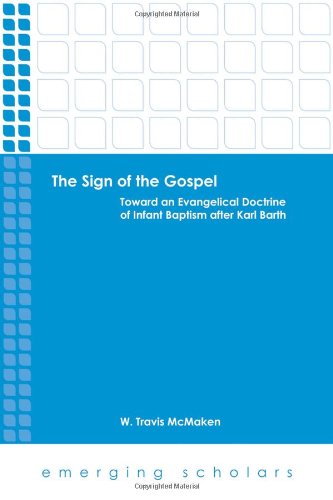Christian Hope is Prayer
Thanks again to the wonderful people at Fortress Press I am reading another great book on the theology of Karl Barth. Barth's views on baptism stand opposed to mine. Not so much that I cannot learn from them. But I couldn't resist the urge to read an in-depth thesis of this rejection of paedobaptism and test myself against him. The author W. Travis McMaken takes up the task of explaining Barth's theology and working past it to an evangelical view of infant baptism. The book is worth the time spent reading it. All this will be explicated more clearly in a review slated for the near future via GraceForSinners. Put another way, that has nothing to do with what I'm about to say. So buckle up for something not related to baptism.
The Sign of the Gospel is riddled with great quotes from both Karl Barth and W. Travis McMaken. Since I try to keep my reviews succinct, I feel compelled to write an off-shoot on the topic of Christian hope and prayer. The concept of hope and prayer comes late in The Sign of the Gospel amidst a discussion of water baptism in Barth's theology. Almost casually a bomb against the current thread of determinism and fatalism is dropped against evangelical laymen,
Christian hope cannot be simply waiting for God to ensure that things turn out for the best. That kind of hope is a passive-aggressive attempt to manipulate God, and Barth associates it with the concept of cheap grace, that is, a “grace which may be counted on in advance, the grace which is disposable, the grace which is waiting to be taken and used by man” (CD IV/4, 209; KD IV/4, 230).
This quote might take many of us by surprise. It wouldn't take me by surprise that this quote might take people by surprise. All things considered the church needs to get over the surprise.
Since I hold to a Reformed view of election and predestination I am often tickled by people who hold differing views on soteriology. They may not agree that the Scriptures teach God's unconditional election unto salvation but get them talking about practical theology (aka life) and the traces of "evangelical fatalism" start popping up everywhere. And I mean everywhere.
Suddenly the God who cannot elect unto salvation is capable of twisting and turning every situation, wether great or small, into a glorious creation independent of our obedience. I get tickled. I'm not disagreeing that our God is capable of doing that. I firmly believe that He can. But our hope as Christians is much greater than sitting back and watching God paint.
Anything less turns than action in response to God turns faith into merely passive internal reflection. Essentially this is the Christian form of zen meditation. We get to sit legs crossed and God can accomplish everything He desires. We just need to close our eyes and stay out of everything.
Luke 18
Luke 18 is my favorite chapter in the gospels. The resurrection passages are awesome. They are the historic realities of new creation. They are the foundation of the gospel. Luke 18 is where the gospel confronts humble people in their depravity.
Because of this Luke 18 competes with 1 Corinthians 15 and Genesis 15 for my favorite chapter in the Scriptures. I have preached and taught from Luke 18 multiple times. I find the chapter littered with Jesus Christ addressing man in desperation and need. And the whole chapter is kicked off in a lesson on prayer,
1 And he told them a parable to the effect that they ought always to pray and not lose heart. 2 He said, “In a certain city there was a judge who neither feared God nor respected man. 3 And there was a widow in that city who kept coming to him and saying, ‘Give me justice against my adversary.’ 4 For a while he refused, but afterward he said to himself, ‘Though I neither fear God nor respect man, 5 yet because this widow keeps bothering me, I will give her justice, so that she will not beat me down by her continual coming.’” 6 And the Lord said, “Hear what the unrighteous judge says. 7 And will not God give justice to his elect, who cry to him day and night? Will he delay long over them? 8 I tell you, he will give justice to them speedily. Nevertheless, when the Son of Man comes, will he find faith on earth?” - Luke 18:1-8
This story always makes me chuckle. The "unrighteous judge" is compared to God. In terms of their response to needy people the two are contrasted. But still it is interesting to see our Savior Jesus Christ utilize this imagery. Not only is God contrasted so interestingly but the heroine is a widow. And a widow who nags and nags until her needs are met. Until justice is met. And the purpose of all of this is simple. The church is to know that we must "pray and not lose heart." And what is this prayer an example of? "Faith on earth." Christian faith. One that saves.
Christian faith in this way is tied to Christian prayer. Christian prayer is "cry[ing] to him day and night." It is with this concept in mind that McMaken and Barth are fundamentally correct about Christian hope. It can be no passive hope. It can be no placated reservation in obedience to God. Christian faith and hope cannot sit back. It is not waiting for God to work things out in the end (which He of course will). It is a desperate droning of petition and pleading. A droning which is followed through with obedience. Genuine Christian hope is portrayed in Christian prayer. It is fulfilled in active striving through faith. It is endless. It is perpetual sighing. It is groaning without words (Rom 8:26).





